新目标九年级英语期末复习手册_2
人教版新目标九年级全册英语 Unit 2 知识点总结复习提纲
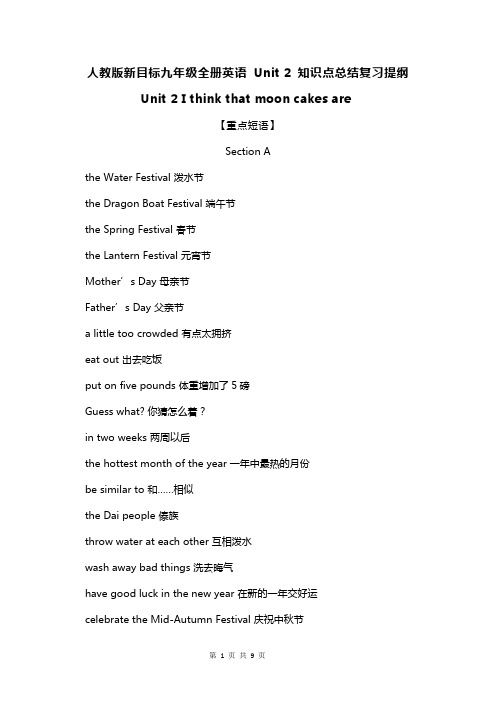
人教版新目标九年级全册英语Unit 2 知识点总结复习提纲Unit 2 I think that moon cakes are【重点短语】Section Athe Water Festival 泼水节the Dragon Boat Festival 端午节the Spring Festival 春节the Lantern Festival 元宵节Mother’s Day 母亲节Father’s Day 父亲节a little too crowded 有点太拥挤eat out 出去吃饭put on five pounds 体重增加了5磅Guess what? 你猜怎么着?in two weeks 两周以后the hottest month of the year 一年中最热的月份be similar to 和……相似the Dai people 傣族throw water at each other 互相泼水wash away bad things 洗去晦气have good luck in the new year 在新的一年交好运celebrate the Mid-Autumn Festival 庆祝中秋节in the shape of a full moon 一轮满月的形状on the Mid-Autumn night 在中秋节的晚上traditional folk stories 传统民间故事shoot down 射下magic medicine 仙药live forever 长生不老plan to do sth. 计划做某事refuse to do sth. 拒绝做某事lay out 摆开;布置start the tradition of ... 开始……的传统admire the moon 赏月Section Btrick or treat 不给糖就捣乱light candles 点燃蜡烛play a trick on sb. 捉弄某人give sb. a treat 款待某人dress up as cartoon characters 装扮成卡通人物the true meaning of Christmas 圣诞节的真正含义care about 关心;在意make more money 赚更多的钱Christmas Eve 平安夜business partner 生意伙伴warn sb. to do sth. 警告某人做某事end up 最终成为;最后处于expect sb. to do sth. 期待某人做某事take him back to his childhood 把他带回到童年remind sb. of sth. 提醒某人某事wake up 叫醒decide to do sth. 决定做某事promise to do sth. 承诺做某事celebrate Christmas with his relatives 和他的亲戚们一起庆祝圣诞节give gifts to people in need 把礼物给需要的人treat everyone with kindness and warmth 对待每一个人都充满善意和温暖spread love and joy 传播爱和快乐【考点详解】1. What + a(n) + 形容词+ 可数名词的单数形式+主语+谓语+其他)!多么……的……!2. How + 形容词/副词(+主语+谓语+其他)!……多么……!3. be going to 将要/打算……4. in + 时间段在……后5. give sb. sth.=give sth. to sb. 给某人某物;把某物给某人6. plan to do sth. 计划做某事7. refuse to do sth. 拒绝做某事。
新目标九年级英语2单元复习
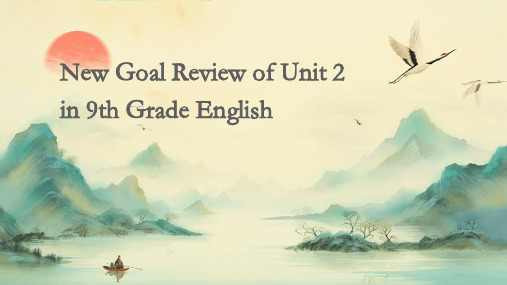
carry out lifeboat drill
实践演练
通过进行实际的语法练习和习题演练,学生可以将所学知识付诸实践,提高语言运用能力。同时,通 过纠错和反思,学生可以更好地掌握语法要点,避免常见错误。
04
Review of Unit Texts
Review of Text Content
01
settings.
Emotional goals
01
Motivation and Interest
Stimulate students' interest in English literature and language, fostering a love for reading and writing.
01
Unit Review Objectives
Knowledge objectives
Vocabulary and Grammar
Ensure students understand and can apply key vocabulary and grammar rules learned in the unit.
ห้องสมุดไป่ตู้
学习并掌握Unit 2中的重点词汇和短语,包括它们的发 音、拼写和意义。
通过上下文理解词汇和短语的语境意义,积累丰富的语 言表达。
The cultural background in the text
01
拓展文化知识和背景
02
学习Unit 2中涉及的文化背景知识,包括 相关的历史、社会和文化现象。
Develop students' ability to read and understand complex texts,
九年级英语期末复习手册

九年级英语期末复习手册Unit 1 复习要点一、短语。
1. by making flashcards 通过做单词抽认卡2. ask…for help 向某人求助3. read aloud 朗读4. that way (=in that way) 通过那种方式5. improve my speaking skills 提高我的会话技巧6. for example 例如7. have fun doing sth 玩得高兴8. have conversations with friends 与朋友对话9. get excited about 为…高兴,激动10.end up speaking in Chinese 以说汉语结束对话11.do a survey about…做有关…的调查12.keep an English notebook 记英语笔记13.spoken English (= oral English) 英语口语14.make mistakes in sth 在…犯错误15.get the pronunciation right 使发音准确16.practise speaking English 练习说英语17.first of all 首先18.begin with 以…开始ter on 随后20.in class 在课堂上ugh at 嘲笑22.take notes 记笔记23.enjoy doing 喜欢干… 24.write down 写下,记下25.look up (v + adv) 查找,查询26.native speakers 说本族话的人27.make up 编造,虚构,化妆,打扮28.around the world 全世界29.deal with 对待,处理,解决30.worry about (be worried about) 担心,担忧31.be angry with 生某人的气32.stay angry 生气33.go by 消逝34. regard…as…把…当做…plain about/of 抱怨36. with the help of 在…的帮助下pare…to (with)…把…和…作比较38.think of (think about) 想起,想到39.physical problems 身体上的问题40.break off 中断,突然终止41.not…at all 根本不,全然不42.make complete sentences 做完整的句子43.join 加入某团体并成为其中一员;join in与take part in指参加到某项活动中去。
(完整版)人教版新目标九年级全册英语复习资料

九年全册英复料◆unit1 How do you study for a test?一.复重点1.目言: talk about how to study,2.要求背部分 P3G ,P4-3a, P6-3a, P8-reading3.背表。
1. 4.复教材所有内容,复所做的,侧重基目。
二.知点:1.frustrate,frustrating,frustrated : frustrate 意思“使绝望,使沮,使” ,是及物,后来接; frustrating 意思“令人沮的,令人绝望的”。
是指某事令人绝望,含有主意,主一般物; frustrated 意思“沮的,绝望的”。
是指某物感觉绝望,相当于 disappointed,含有被意,主一般人。
短 be frustrated in 意思“遭到失”。
2.介 by , with, in , on 表方式 : by+交通工具(注意不冠),by+doing sth 通⋯方式;with+ 工具,with a pen, with+人体部位, with our eyes;in +言,in English, in+物资料, in ink (墨水) =by pen;on+器或媒介 on TV3.Ever 的用法:ever 相当于 at any time,意思“曾”。
同always,反never.常于在达成的一般疑句及条件状从句,其余状况下也有所使用。
1)用于在达成的一般疑句中。
Have you ever been to Shanghai? )2用于条件状从句。
If you ever hear from her, please tell me about it.3)用于一般在的疑句中。
Do you ever talk to your English friends?4)用于否认句。
No man ever returned from here.5)用于必定句中,表示“经常,是” ,常使用 always.注意: ever 和 always 的反都是 never。
精品推荐:新目标九年级英语期末复习手册
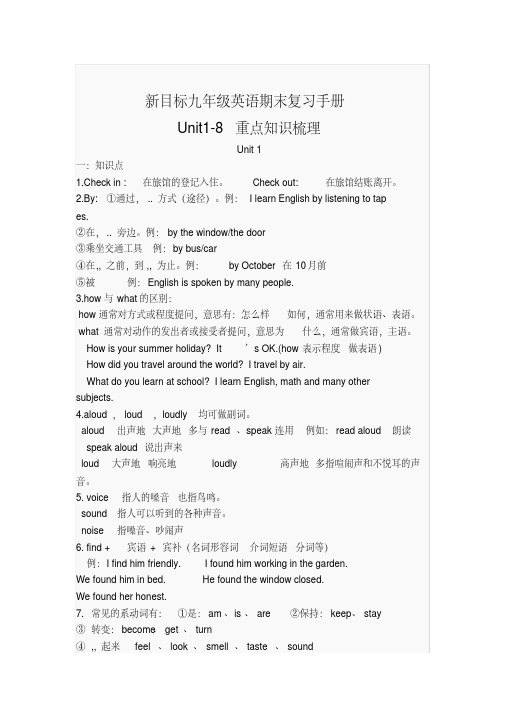
新目标九年级英语期末复习手册Unit1-8重点知识梳理Unit 1一:知识点1.Check in : 在旅馆的登记入住。
Check out: 在旅馆结账离开。
2.By: ①通过,..方式(途径)。
例:I learn English by listening to tapes.②在,..旁边。
例:by the window/the door③乘坐交通工具例:by bus/car④在,,之前,到,,为止。
例:by October在10月前⑤被例:English is spoken by many people.3.how与what的区别:how通常对方式或程度提问,意思有:怎么样如何,通常用来做状语、表语。
what通常对动作的发出者或接受者提问,意思为什么,通常做宾语,主语。
How is your summer holiday? It’s OK.(how表示程度做表语)How did you travel around the world? I travel by air.What do you learn at school? I learn English, math and many other subjects.4.aloud, loud ,loudly 均可做副词。
aloud 出声地大声地多与read 、speak连用例如:read aloud 朗读speak aloud说出声来loud 大声地响亮地 loudly 高声地多指喧闹声和不悦耳的声音。
5. voice 指人的嗓音也指鸟鸣。
sound 指人可以听到的各种声音。
noise 指噪音、吵闹声6. find + 宾语 + 宾补(名词形容词介词短语分词等)例:I find him friendly. I found him working in the garden.We found him in bed. He found the window closed.We found her honest.7. 常见的系动词有:①是:am 、is、 are ②保持:keep、 stay③转变:become、 get、 turn④,,起来 feel、 look、 smell、 taste、 sound8. get + 宾语 + 宾补(形容词过去分词动词不定式)使某种情况发生例:Get the shoes clean. 把鞋擦干净 Get Mr. Green to come. 让格林先生进来I want to get my bike repaired. 我想去修自行车You can’t get him waiting. 你不能让他老等着9. 动词不定式做定语①与所修饰的名词构成主谓关系The next train to arrive was from New York. He is always the first tocome.②与所修饰的名词构成动宾关系I have nothing to say. I need a pen to write with.I need some paper to write on. I don’t have a room to live in.10. practice , fun 做名词为不可数名词 11. add 补充说又说12. join 加入某团体并成为其中一员 attend 出席参加会议或讲座join in与take part in指参加到某项活动中去。
新目标九年级英语期末复习提纲(unit2)

新目标九年级英语期末复习提纲Unit 2一. 知识点1. used to 过去常常做某事,暗指现在已经不存在的动作或状态. 后跟动词原形.否定形式为: didn’t use to 或 usedn’t to 疑问形式为: Did…use to…? 或 Used…to…?be/get used to 习惯于, to 为介词.2. wear 表示状态. put on 表示动作. dress + 人给某人穿衣服.3. on the swim team on 是…的成员,在…供职.4. Don’t you remember me? 否定疑问句.Yes, I do. 不, 我记得. No, I don’t 是的, 我不记得了.5. 反意疑问句:①陈述部分的主语为 this, that, 疑问部分主语用it; 陈述部分主语用 these, those, 疑问部分用they 做主语.例: This is a new story, isn’t it? Those are your parents, aren’t they?②陈述部分是 there be 结构, 疑问部分仍用 there例: There was a man named Paul, wasn’t there?③ I am 后的疑问句, 用aren’t I例: I am in Class 2, aren’t I?④陈述部分与含有 not, no, never, few, little, hardly, seldom, neither, none 等词时,疑问部分用肯定.例: Few people liked this movie, didn’t they?但陈述句中若带有否定前缀或后缀的单词时, 这个句子仍视为肯定, 后面仍用否定.例: Your sister is unhappy, isn’t she?⑤陈述部分的主语若为不定式或 V-ing 短语, 疑问部分主语用it.例: To spend so much money on clothes is unnecessary, isn’t it?⑥陈述句中主语是 nobody, no one, everyone, everybody 等指人的不定代词时,疑问部分用they做主语; 若陈述部分主语是 something, anything, noting, everything 等指事物的不定代词时, 疑问部分用it 做主语.例: Nobody says one word about the accident, do they?Everything seems perfect, doesn’t it?⑦当主语是第一人称I时, 若谓动为think, believe, guess 等词时, 且其后跟宾丛,这时疑问句部分的人称, 时态要与宾语从句保持一致, 同时还要考虑否定转移.例: I don’t think he can finish the work in time, can he?⑧前面是祈使句, 后用 will you? (let’s 开头时, 后用shall we?)6. be terrified of 害怕的程度比 be afraid of 深.7. miss: ①思念, 想念例: I really miss the old days. ②错过, 未中, 未赶上, 未找到. 例: It’s a pity that you miss the bus.8. no more (用在句中)=not…any more (用在句尾) 指次数;no longer (用在句中)=not…any longer (用在句尾) 指时间. 9. right: ① adj. 正确的, 对的, 右边的② n. 右方, 权利③ adv. 直接地.10. It seems that Yu Mei has changed a lot. = Yu Mei seems to have changed a lot.11. afford + n. /pron. afford + to do 常与can, be able to 连用.例: Can you afford a new car?The film couldn’t afford to pay such large salaries.12. as well as 连词, 不但…而且…强调前者. (若引导主语, 谓动与前者在人称和数上一致例: Living things need air and light as well as water. 生命不仅需要水, 还需要空气和阳光.13. alone = by oneself 独自一人. lonely 孤独的, 寂寞的.14. in the last/past + 一段时间 during the last/past + 一段时间与现在完成时连用.15. die (v.) dead (adj.) death (n.) dying (垂死的)二. 短语1. be more interested in 对…更感兴趣.2. on the swim team 游泳队的队员.3. be terrified of 害怕.4. gym class 体操课.5. worry about. 担心.6. all the time 一直, 总是7. chat with 与…闲聊8. hardly ever 几乎从不9. walk to school = go to school on foottake the bus to school = go to school by bus 10. as well as 不仅…而且11. get into trouble 遇到麻烦 12. make a decision 做出决定13. to one’s surprise 使某人吃惊的是 14. take pride in 为…感到骄傲15. pay attention to 留心, 注意16. consist of 由…组成/构成. be made up of 由…组成/构成.17. instead of 代替, 而不是 18. in the end 最后, 终于 19. play the piano 弹钢琴三.句子1.I used to be afraid of the dark. 我以前害怕黑暗.2.I go to sleep with my bedroom light on. 我开着卧室的灯睡觉.3.I used to spend a lot of time playing games with my friends.以前我常常花很多时间和我的朋友们玩游戏.4.I hardly ever have time for concerts. 我几乎没有时间去听音乐会.5.My life has changed a lot in the last few years.6.It will make you stressed out. 那会使你紧张的.7.It seems that Yu Mei has changed a lot. 玉梅似乎变化很大.【模拟练习】一. 根据首字母及句子的意思完成下列单词。
新目标九年级英语期末复习手册
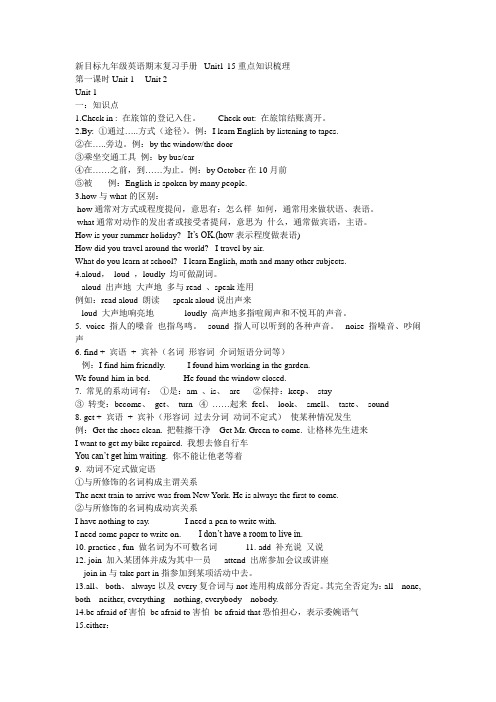
新目标九年级英语期末复习手册Unit1-15重点知识梳理第一课时Unit 1--- Unit 2Unit 1一:知识点1.Check in : 在旅馆的登记入住。
Check out: 在旅馆结账离开。
2.By: ①通过…..方式(途径)。
例:I learn English by listening to tapes.②在…..旁边。
例:by the window/the door③乘坐交通工具例:by bus/car④在……之前,到……为止。
例:by October在10月前⑤被例:English is spoken by many people.3.how与what的区别:how通常对方式或程度提问,意思有:怎么样如何,通常用来做状语、表语。
what通常对动作的发出者或接受者提问,意思为什么,通常做宾语,主语。
How is your summer holiday? It‟s OK.(how表示程度做表语)How did you travel around the world? I travel by air.What do you learn at school? I learn English, math and many other subjects.4.aloud,loud ,loudly 均可做副词。
aloud 出声地大声地多与read 、speak连用例如:read aloud 朗读speak aloud说出声来loud 大声地响亮地loudly 高声地多指喧闹声和不悦耳的声音。
5. voice 指人的嗓音也指鸟鸣。
sound 指人可以听到的各种声音。
noise 指噪音、吵闹声6. find + 宾语+ 宾补(名词形容词介词短语分词等)例:I find him friendly. I found him working in the garden.We found him in bed. He found the window closed.7. 常见的系动词有:①是:am 、is、are ②保持:keep、stay③转变:become、get、turn ④……起来feel、look、smell、taste、sound8. get + 宾语+ 宾补(形容词过去分词动词不定式)使某种情况发生例:Get the shoes clean. 把鞋擦干净Get Mr. Green to come. 让格林先生进来I want to get my bike repaired. 我想去修自行车You can‟t get him waiting. 你不能让他老等着9. 动词不定式做定语①与所修饰的名词构成主谓关系The next train to arrive was from New York. He is always the first to come.②与所修饰的名词构成动宾关系I have nothing to say. I need a pen to write with.I need some paper to write on. I don‟t have a room to live in.10. practice , fun 做名词为不可数名词 11. add 补充说又说12. join 加入某团体并成为其中一员attend 出席参加会议或讲座join in与take part in指参加到某项活动中去。
人教版新目标九年级英语Unit 2 I think that mooncakes are delicious!复习教案
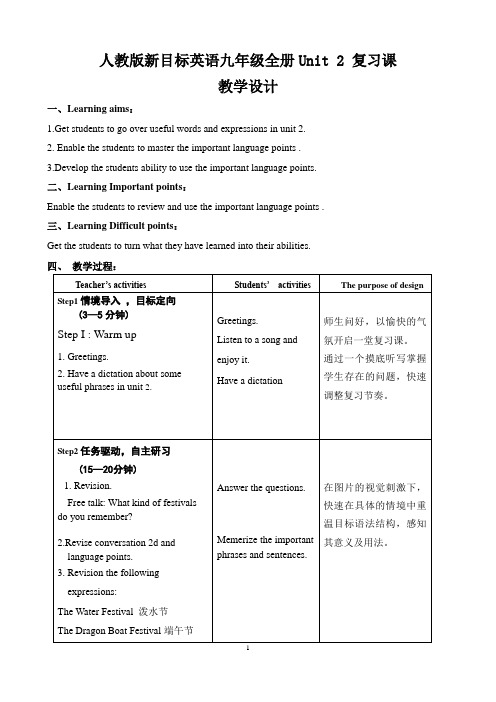
Fill in the blank.
Revise and try to remember.
Fill in the blank.
2.宾语从句的时态一般受主句时态的影响。当主句是__________或一般将来时,宾语从句可以根据具体情况用适当的时态;当主句是一般过去时,从句要用相应的________。但当从句表示的是名言、客观真理或自然现象等时,一般_____ (不受/受)主句时态的限制,均用一般现在时。
uestions.
Memerize the important phrases and sentences.
.
Read the passages and fill in the blanks.
Revise the important phrases and language points.
3. Revision the following
expressions:
The Water Festival泼水节
The Dragon Boat Festival端午节
Chinese Spring Festival春节
The Lantern Festival元宵节
visit one’s relatives拜访亲戚
3. Let Ss read the important sentences and revise the grammar focus.
宾语从句与感叹句
1.宾语从句是由一个_____作_____,
通常由______词,如:____, ____, _______或_____词连接。
初中英语人教新目标九年级全册 Unit 2 知识点(重点语块+词形变换+重点句子)

九年级英语全册Unit 2知识点SectionA【重点语块】1.share mooncakes with their families与他们的家人分享月饼2.the Lantern Festival元宵节3.the Water Festival泼水节4.visit his relatives拜访他的亲属5.put on five pounds增重了五磅6.a goddess一位女神7.in the shape of a full moon呈满月形8.on the Mid-Autumn night在中秋节的晚上9.traditional folk stories/tales传统民间故事10.in the garden在花园里11.wear a tie打领带12.eat out出去吃饭13.Guess what?你猜怎么着?猜猜看?14.I wonder if/whether...我想知道是否……15.throw water at each other互相泼水16.throw the book to me把书扔给我17.wash away bad things洗去晦气18.carry people's wishes承载着人们的祝愿19.shoot down the nine suns射掉九个太阳20.shoot at..瞄准……射击(过程)21.ask a stranger for help向一个陌生人求助22.try to steal the medicine试图偷药y out fruits and desserts摆放水果和甜点24.refuse to give the medicine to him拒绝把药给他25.call out her name to the moon对着月亮呼唤她的名字26.admire the moon 赏月27.be similar to...与……相似28.in two weeks 两周后【词形变换】1.stranger n.陌生人→strange adj.陌生的;奇怪的→strangely adv.奇怪地2.touching/moving adj.令人感动的→touched /moved adj.感动的3.steal v.偷;窃取→stole(过去式)→stolen (过去分词)y v.放置;安放;产(卵);下(蛋)→laid(过去式)→laid(过去分词)5.shoot v.射击→shot(过去式)→shot(过去分词)6.tradition n.传统→traditional adj.传统的;惯例的7.tie n.领带 v.捆;束→tying(现在分词)8.admire v.欣赏;仰慕→admiration n.欣赏;仰慕;赞美;钦佩9.whoever pron.无论谁;不管什么人 whatever无论什么→whenever无论何时→wherever 无论哪里→however无论怎【重点句子】1.—What do you like best about the Dragon Boat Festival?—I love the races.I think that they're fun to watch.—你最喜欢端午节的什么?—我喜欢(划龙舟)比赛。
新目标九年级英语期末复习提纲(unit2)讲课稿

新目标九年级英语期末复习提纲Unit 2一. 知识点1. used to 过去常常做某事,暗指现在已经不存在的动作或状态. 后跟动词原形.否定形式为: didn’t use to 或 usedn’t to 疑问形式为: Did…use to…? 或 Used…to…?be/get used to 习惯于, to 为介词.2. wear 表示状态. put on 表示动作. dress + 人给某人穿衣服.3. on the swim team on 是…的成员,在…供职.4. Don’t you remember me? 否定疑问句.Yes, I do. 不, 我记得. No, I don’t 是的, 我不记得了.5. 反意疑问句:①陈述部分的主语为 this, that, 疑问部分主语用it; 陈述部分主语用 these, those, 疑问部分用they 做主语.例: This is a new story, isn’t it? Those are your parents, aren’t they?②陈述部分是 there be 结构, 疑问部分仍用 there例: There was a man named Paul, wasn’t there?③ I am 后的疑问句, 用aren’t I例: I am in Class 2, aren’t I?④陈述部分与含有 not, no, never, few, little, hardly, seldom, neither, none 等词时,疑问部分用肯定.例: Few people liked this movie, didn’t they?但陈述句中若带有否定前缀或后缀的单词时, 这个句子仍视为肯定, 后面仍用否定.例: Your sister is unhappy, isn’t she?⑤陈述部分的主语若为不定式或 V-ing 短语, 疑问部分主语用it.例: To spend so much money on clothes is unnecessary, isn’t it?⑥陈述句中主语是 nobody, no one, everyone, everybody 等指人的不定代词时,疑问部分用they做主语; 若陈述部分主语是 something, anything, noting, everything 等指事物的不定代词时, 疑问部分用it 做主语.例: Nobody says one word about the accident, do they?Everything seems perfect, doesn’t it?⑦当主语是第一人称I时, 若谓动为think, believe, guess 等词时, 且其后跟宾丛,这时疑问句部分的人称, 时态要与宾语从句保持一致, 同时还要考虑否定转移.例: I don’t think he can finish the work in time, can he?⑧前面是祈使句, 后用 will you? (let’s 开头时, 后用shall we?)6. be terrified of 害怕的程度比 be afraid of 深.7. miss: ①思念, 想念例: I really miss the old days. ②错过, 未中, 未赶上, 未找到. 例: It’s a pity that you miss the bus.8. no more (用在句中)=not…any more (用在句尾) 指次数;no longer (用在句中)=not…any longer (用在句尾) 指时间. 9. right: ① adj. 正确的, 对的, 右边的② n. 右方, 权利③ adv. 直接地.10. It seems that Yu Mei has changed a lot. = Yu Mei seems to have changed a lot.11. afford + n. /pron. afford + to do 常与can, be able to 连用.例: Can you afford a new car?The film couldn’t afford to pay such large salaries.12. as well as 连词, 不但…而且…强调前者. (若引导主语, 谓动与前者在人称和数上一致例: Living things need air and light as well as water. 生命不仅需要水, 还需要空气和阳光.13. alone = by oneself 独自一人. lonely 孤独的, 寂寞的.14. in the last/past + 一段时间 during the last/past + 一段时间与现在完成时连用.15. die (v.) dead (adj.) death (n.) dying (垂死的)二. 短语1. be more interested in 对…更感兴趣.2. on the swim team 游泳队的队员.3. be terrified of 害怕.4. gym class 体操课.5. worry about. 担心.6. all the time 一直, 总是7. chat with 与…闲聊8. hardly ever 几乎从不9. walk to school = go to school on foottake the bus to school = go to school by bus 10. as well as 不仅…而且11. get into trouble 遇到麻烦 12. make a decision 做出决定13. to one’s surprise 使某人吃惊的是 14. take pride in 为…感到骄傲15. pay attention to 留心, 注意16. consist of 由…组成/构成. be made up of 由…组成/构成.17. instead of 代替, 而不是 18. in the end 最后, 终于 19. play the piano 弹钢琴三.句子1.I used to be afraid of the dark. 我以前害怕黑暗.2.I go to sleep with my bedroom light on. 我开着卧室的灯睡觉.3.I used to spend a lot of time playing games with my friends.以前我常常花很多时间和我的朋友们玩游戏.4.I hardly ever have time for concerts. 我几乎没有时间去听音乐会.5.My life has changed a lot in the last few years.6.It will make you stressed out. 那会使你紧张的.7.It seems that Yu Mei has changed a lot. 玉梅似乎变化很大.【模拟练习】一. 根据首字母及句子的意思完成下列单词。
人教新目标英语九年级Unit2期末复习学案(英语教案)

unit2复习教案Learning aims:1.Get students to go over useful words and expressions in unit2.2. Enable the students to master the important language points .3.Develop the students ability to use the important language points.Learning Important points:Enable the students to review and use the important language points .Learning Difficult points:Get the students to turn what they have learned into their abilities.Learning procedures:step Ⅰ Check upHave a dictation about some useful words in unit 2.step ⅡSelf—learningRevision the following expressions1.The Water Festival 泼水节2.The Dragon Boat Festival端午节3.Chinese Spring Festival 春节4. The Lantern Festival 元宵节5. go to Macao for the vacation.去澳门度假6. visit one’s relatives 拜访亲戚7.put on 增加(体重)发胖8. That sounds like fun听起来好像有趣9.that’s true 确实10.be similar to 和…相似11. throw water at each other互相泼水12. wash away 洗掉13. celebrate Mid-Autumn Festival 庆祝中秋15.fly up to 飞往16.Mooncakes are in the shape of a full moon 月饼是满月的形状17. traditional folk stories传统民间故事18.the story of Chang’e is the most touching嫦娥的故事最令人感动19. shoot down 射下20.live forever 长生不老21. refuse to do sth 拒绝干某事22.fly up to the moon 飞到月亮(上)23. call out sb 呼叫某人24. plan to do sth 计划做某事25. lay out布置,摆开26. come back 回来27. the tradition of admiring the moon 赏月的传统28. the tradition of sharing mooncakes 分享月饼的传统29. admire the mo on 赏月30. two special days 两个特殊的日子31. Father’s Day 父亲节32. common gifts 普通的礼物stepⅢ Explanation and summary1.Get the students to master the following language points.1)be worth doing sth 值得做某事2)carry Sth to +地点名词把某物搬到…… carry Sth for sb 为某人拿某物3)plan to do sth 计划做某事4)punish sb for 因为……惩罚某人5)end up doing sth 以……结束最终成为…… end up with 以……结束6)warn sb to do sth 提醒某人做某事7)expect sb to do sth 期待(希望)某人做某事8)remind sb of sth 使某人想起事9)promise to do sth 答应做某事许诺做某事10)fail to do sth 未能做某事没有做某事11) agree with sb 同意某人(意见)agr ee to sth 同意(接受)某事agree on sth赞同对方意见agree to do sth 同意做某事12)used to do sth 过去常常做某事be used to do sth 被用于做某事be used for doing sth 被用于做某事be used to doing sth 习惯于做某事13) refuse to do sth 拒绝做某事2.Have the students review the following sentences:1)I know that the Water Festival is really fun. 我知道泼水节真的很好玩。
新目标九年级Unit2教学复习要点及练习
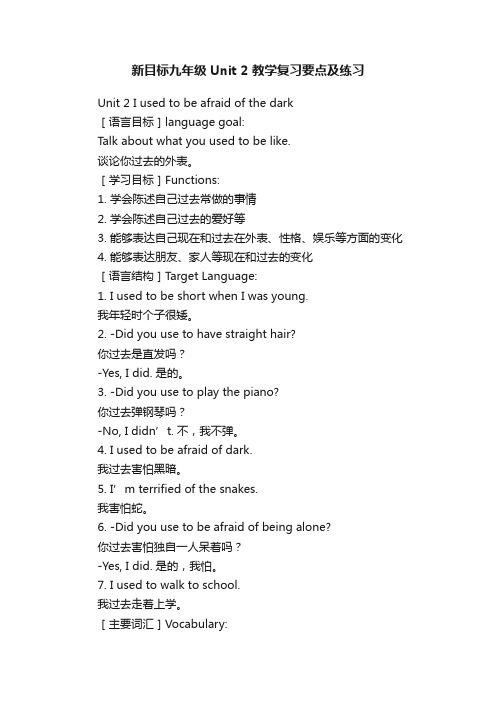
新目标九年级 Unit 2 教学复习要点及练习Unit 2 I used to be afraid of the dark[语言目标]language goal:Talk about what you used to be like.谈论你过去的外表。
[学习目标]Functions:1. 学会陈述自己过去常做的事情2. 学会陈述自己过去的爱好等3. 能够表达自己现在和过去在外表、性格、娱乐等方面的变化4. 能够表达朋友、家人等现在和过去的变化[语言结构]Target Language:1. I used to be short when I was young.我年轻时个子很矮。
2. -Did you use to have straight hair?你过去是直发吗?-Yes, I did. 是的。
3. -Did you use to play the piano?你过去弹钢琴吗?-No, I didn’t. 不,我不弹。
4. I used to be afraid of dark.我过去害怕黑暗。
5. I’m terrified of the snakes.我害怕蛇。
6. -Did you use to be afraid of being alone?你过去害怕独自一人呆着吗?-Yes, I did. 是的,我怕。
7. I used to walk to school.我过去走着上学。
[主要词汇]Vocabulary:dark 黑暗 sure 无疑,确实 terrify 使害怕,使恐惧on 接通的,工作着的 spider 蜘蛛 insect 昆虫chew 嚼,咀嚼 gum 口香糖 right 立即,马上comic 连环漫画 hardly 不十分,简直没有used to do sth. 过去经常 be interested in 对…感兴趣be on the swim team 是游泳队成员 be afraid of 害怕be terrified of 害怕 with the light on 灯开着做…worry about 担心 chew gum 嚼口香糖these days 目前,如今 n ot…anymore 不再[词汇复习]recycling:short hair 短发 curly hair 卷发long hair 长发 straight hair 直发tall 高的 short 矮的(be)medium height 中等身高 thin 瘦的heavy 重的,沉的 (have/has) a medium build 中等胖瘦[语法分析]一、本单元语法重点内容是used to这个句型。
新目标人教版九年级英语期末总复习

新目标人教版九年级英语期末总复习【一】:新目标英语九年级期末复习知识点总结英语九年级期末复习知识点总结I study by working with a group.(P2)by 用法小结在……旁边(near) Will you sit down here by the window在……之前 I have to go back by ten oclock.By the time I went home, my mom had cooked lunch.借助于……,用…… I go to school by bus.I learn English by listening to the radio.deal with (P8)How will you deal with this problemWhat will you do with this problemI used to be afraid of the dark.(P10)used to do sth. 过去常常…… be/get used to doing sth. 习惯于…… be afraidof=be terrified ofSixteen-year-olds should not be allowed to get their ears pierced. (P18)● sixteen-year-olds=sixteen-year-old teenagers● get their ears pierced get/have sth. doneWhat would you do if you had a million dollars(P26)●具体数字/several + hundred/thousand/million/billion hundreds/thousands/millions/billions of●虚拟语气主语+would/should/could + V原 if + 主语+ 过去时态( be动词用were )It must belong to Carla. (P34) belong to sb.=be sbsShes worried because of her test. (P 36)● because of + 短语 because + 句子(主语+谓语)● be worried about=worry about 担心……There must be something visiting the homes in our neighborhood.(P38)● There be …doing sth. There be 句型中不能再有have/has ● must be 一定10. Ill help clean up the city parks. ( P60 )动词+副词,代词放中间cheer up ,set up , put up, fix up, cut up, clean up, give up, pick up,look up, mix up, use up, eat up, give out ,work out ,hang out, hand out, clean out, turn on, turn off, turn down, turn up, take off, put off, put on, give away, put away, think over, look over1 Its used for seeing in the dark.(P69)be used by 被……使用be used for doing sth.=be used to do sth. 被用来做……be used as 把……用作……1 I only just made it to my class. (P78) 我刚好到达教室。
新版新目标英语九年级unit2知识点总结
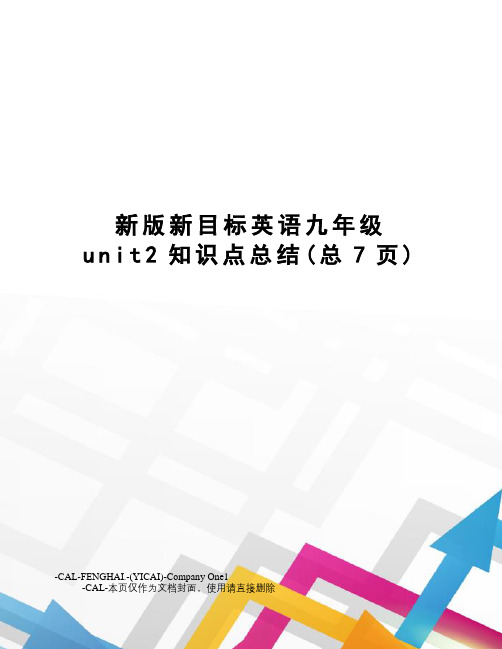
新版新目标英语九年级u n i t2知识点总结(总7页)-CAL-FENGHAI.-(YICAI)-Company One1-CAL-本页仅作为文档封面,使用请直接删除Unit2 I think that mooncakes are delicious!1.crowded 形容词,拥挤的 be crowded with 被….挤满2.wonder v想知道相当于want to know(1)后接who, what, why等连接词引导的宾语从句及“疑问词+动词不定式”结构时,想知道I wonder who that boy is.(2)后接if 或whether 引导的从句时,表示一种委婉的请求或疑问,I wonder if I could use your mobile phone.(3)后接that引导的宾语从句以及动词不定式短语时,(对….)感到惊讶I wonder to see her looking so cheerful.(4)wonder n奇迹,奇观 What are the Seven Wonders in the world?(5)wonderful 形容词3.whether 与 if(1)引导宾语从句意为是否,可以互换。
(2)引导宾语从句时,whether可直接与or not 连用,而if不可以。
I don’t know whether or not I should go.(3)if引导条件状语从句,如果,而whether不可以。
If i t doesn’t rain tomorrow, we will go camping.4. go to…for a/one’s vacation 去….度假(假期还没有开始) go on vacation 在度假holiday假日 vacation假期(1)对于英国人或者澳大利亚人来说,“假日”的意思等同于“假期”经常用holiday.(2)对美国人,“假日”是指一个特殊的日子,好像圣诞节,而“假期”是指你会花两到三周的时间\ 和你的家人出去旅行。
2023年人教版新目标九年级英语Unit2重点考点总结
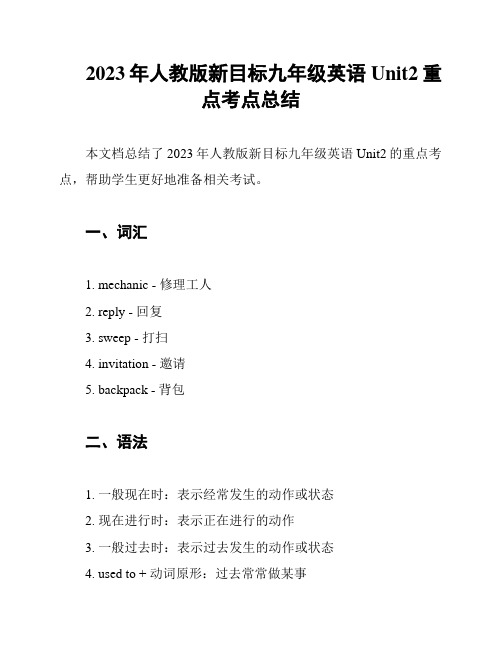
2023年人教版新目标九年级英语Unit2重点考点总结本文档总结了2023年人教版新目标九年级英语Unit2的重点考点,帮助学生更好地准备相关考试。
一、词汇1. mechanic - 修理工人2. reply - 回复3. sweep - 打扫4. invitation - 邀请5. backpack - 背包二、语法1. 一般现在时:表示经常发生的动作或状态2. 现在进行时:表示正在进行的动作3. 一般过去时:表示过去发生的动作或状态4. used to + 动词原形:过去常常做某事5. be going to + 动词原形:表示将来计划或打算做某事三、句型1. Can you + 动词原形...? - 你能...吗?2. What are you doing? - 你在做什么?3. How often do you...? - 你多久做一次...?4. I used to + 动词原形... - 我过去常常...5. I am going to + 动词原形... - 我打算...四、对话及表达以下是一些常见的对话及表达,帮助学生提高口语表达能力:1. -- Can you help me clean the classroom?-- Sure, I'd be happy to. / Sorry, I'm busy right now.2. -- What are you doing?-- I'm studying for the English test.3. -- How often do you do exercise?-- I exercise three times a week.4. -- What did you use to do in your free time?-- I used to play soccer with my friends.5. -- What are you going to do this weekend?-- I am going to visit my grandparents.五、练题下面是一些练题,供学生巩固所学知识:1. 用一般现在时完成句子:She __________ (speak) English fluently.2. 划线部分提问:I am going to the park.3. 用一般过去时完成句子:He _________ (watch) a movie last night.六、总结本文档总结了2023年人教版新目标九年级英语Unit2的重点考点,包括词汇、语法、句型,以及常见对话及表达。
人教新目标版九年级全册Unit2复习知识点
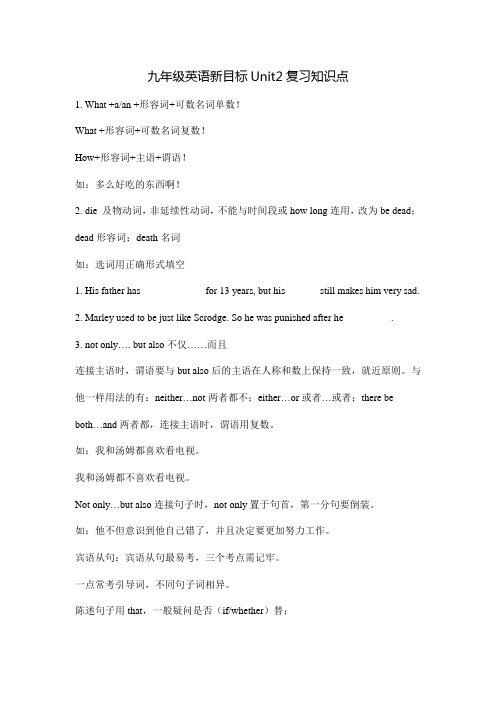
九年级英语新目标Unit2复习知识点1. What +a/an +形容词+可数名词单数!What +形容词+可数名词复数!How+形容词+主语+谓语!如:多么好吃的东西啊!2. die 及物动词,非延续性动词,不能与时间段或how long连用,改为be dead;dead形容词;death名词如:选词用正确形式填空1. His father has ____________ for 13 years, but his ______ still makes him very sad.2. Marley used to be just like Scrodge. So he was punished after he _________.3. not only…. but also不仅……而且连接主语时,谓语要与but also后的主语在人称和数上保持一致,就近原则。
与他一样用法的有:neither…not两者都不;either…or或者…或者;there be both…and两者都,连接主语时,谓语用复数。
如:我和汤姆都喜欢看电视。
我和汤姆都不喜欢看电视。
Not only…but also连接句子时,not only置于句首,第一分句要倒装。
如:他不但意识到他自己错了,并且决定要更加努力工作。
宾语从句:宾语从句最易考,三个考点需记牢。
一点常考引导词,不同句子词相异。
陈述句子用that,一般疑问是否(if/whether)替;特殊问句更好办,引导还用疑问词。
二点时态常变化,主句不同从句异。
主句若为现在时,从句时态应看意;主句若为过去时,从句时态向前移。
三点语序要牢记,陈述语序从句中。
短语:A:1. be/come/go back=return 2. be fun (形容词)to do sth3. put on 增加;穿上,动副短语,代词宾格放中间4. in +时间段(表……之后,用于将来时)5. be similar to;look/ be like;be / look the same as6. throw …at7. wash away8. a time for doing9. in the shape of呈……的形状10. on +修饰词+night/morning/afternoonOn the night/morning/afternoon of +日期11. shoot down 射下12. try to do 尽量做某事Try/ do one’s best to do sth 尽某人努力做某事Try doing sth. 尝试做某事13. fly up to 飞向14. refuse to do sth 拒绝做某事15. call out 召唤16. lay out 摆放17. end up (doing sth./ with sth.) 18. plan to do; make plans to do19. share…with 20. take sb out for 21. one…the other(两个中一个,另一个) B:1. dress up (as) 装扮(成)2. trick or treat 3. learn about4. take…around5. play a trick on sb. 招待某人6. the spirit of ……的精灵7. the importance of …的重要性8. think of 想起;想出9. care about 关心,在意take care=be careful to do 当心做某事look after=take care of=care for关心10. take …back to 把……带回11. warn sb. To do 警告某人做某事12. remind…of 使…回想remind sb. to do 提醒某人做某事13. promise to do 承诺做某事14. treat sb with 用…招待某人15. the beginning of ……的开始16. give out; hand out分发17. wake up 醒来;wake sb. up 叫醒某人18. decide to do; make decisions to do sth. 决定做某事19. give birth to 生…… 20. a symbol of ……的象征。
九级英语全册复习(二)Units34课件(新版)人教新目标版

复习(二)[Units 3~4]
◆基础盘点 Ⅰ.根据句意及汉语提示填写单词 1.Could you tell me how to get to the post office? I want to buy some stamps
(邮票). 2.He had a poor sense of direction (方向) and soon got lost.
5.It’s impolite (polite) of you to talk loudly in public.
6.Would you mind giving us a general introduction (introduce) about the
changes in your life? 7.Gina suggested going (go) to the amusement park, and I agreed.
7.I advise you to go and talk to him in person .
of
are/were proud
Ⅳ.根据汉语意思完成句子,每空一词
1. 沿 着 这 条 街 走 , 银 行 就 在 你 的 右 边 。 Walk along this street and thoen bank
8.I think the light bulb is the most useful (有用的) invention in our life.
9.Teachers’ behavior has a great influence (影响) on the students.
10.This is my private (私人的) room. Please don’t enter it without my
九年级英语全册Unit2基础知识必背手册人教新目标版

九年级英语全册Unit2基础知识必背手册人教新目标版短语归纳1.what time 几点2.go to school 去上学3.get up 起床4.take a shower 洗淋浴5.brush teeth 刷牙6.get to 到达7.do homework 做家庭作业 8.go to work 去上班 9.go home 回家10.eat breakfast 吃早饭 11.get dressed 穿上衣服 12.get home 到家13.either…or…要么…要么… 14.go to bed 上床睡觉 15.in the morning/ afternoon/ evening 在上午/下午/晚上 16.take a walk 散步 17.lots of 许多,大量18.radio station 广播电台 19.at night 在晚上 20.be late for 迟到重点句子点拨1. I used to be afraid of the dark.过去我怕黑暗。
点拨:used to是情态动词,表示过去的习惯动作或过去存在的情况,to是动词不定式符号,后面跟动词原形。
例如:We used to work in the same workshop. 我们曾在同一个车间工作过。
注意:be/get used to doing sth意为“习惯于做某事”,其中的to为介词,后面跟名词、代词或动词的-ing形式。
例如:He is used to reading English in the morning. 他习惯在早上读英语。
2. Did you use to play the piano?你过去常常弹钢琴吗?点拨:这是“used to + 动词原形”的疑问形式。
其疑问式和否定式可以用助动词did,也可以直接用used构成。
例如: Did it use to rain here in summer?(= Used it to rain here in summer?) 这儿以前夏季时常下雨吗?We did not use to see each other. (= We usedn’t to see each other.) 我们以前不常见面。
- 1、下载文档前请自行甄别文档内容的完整性,平台不提供额外的编辑、内容补充、找答案等附加服务。
- 2、"仅部分预览"的文档,不可在线预览部分如存在完整性等问题,可反馈申请退款(可完整预览的文档不适用该条件!)。
- 3、如文档侵犯您的权益,请联系客服反馈,我们会尽快为您处理(人工客服工作时间:9:00-18:30)。
九年级英语下册期末复习手册Unit 1 复习要点一、短语。
1. by making flashcards 通过做单词抽认卡2. ask…for help 向某人求助3. read aloud 朗读4. that way (=in that way) 通过那种方式5. improve my speaking skills 提高我的会话技巧6. for example 例如7. have fun doing sth 玩得高兴8. have conversations with friends 与朋友对话9. get excited about 为…高兴,激动10.end up speaking in Chinese 以说汉语结束对话11.do a survey about… 做有关…的调查12.keep an English notebook 记英语笔记13.spoken English (= oral English) 英语口语 14.make mistakes in sth 在… 犯错误15.get the pronunciation right 使发音准确16.practise speaking English 练习说英语17.first of all 首先18.begin with 以…开始ter on 随后20.in class 在课堂上ugh at 嘲笑22.take notes 记笔记23.enjoy doing 喜欢干… 24.write down 写下,记下25.look up (v + adv) 查找,查询26.native speakers 说本族话的人27.make up 编造,虚构,化妆,打扮28.around the world 全世界29.deal with 对待,处理,解决30.worry about (be worried about) 担心,担忧31.be angry with 生某人的气32.stay angry 生气33.go by 消逝34. regard…as… 把…当做…plain about/of 抱怨36. with the help of 在…的帮助下pare…to (with)… 把…和…作比较38.think of (think about) 想起,想到39.physical problems 身体上的问题40.break off 中断,突然终止41.not…at all 根本不,全然不42.make complete sentences 做完整的句子43.join 加入某团体并成为其中一员;join in与take part in指参加到某项活动中去。
44.be afraid of 害怕be afraid to 害怕45.have trouble in doing sth 做....有困难46.study for a test 为考试用功47. make vocabulary lists 做单词表48. too …to…太…而以致于不能做49.watch English-language TV 看英语电视50. to begin with 首先51.take a lot of grammar notes 记大量的语法笔记52.look up the words in a dictionary 查字(词)典53.this kind of paper 这种纸54.spend …on …在…上花费(时间、金钱)55.speak English as a second language 把英语当做第二语言来说56.give up 放弃57.in the future 在将来二、句型。
1. How do you study for a test? 你怎样为考试做准备?2. I have learned a lot that way. 用那种方法,我已经学到了很多东西。
3. It’s too hard to understand the voice. 听懂那些声音太难了。
4. Memorizing the words of pop songs also helped a little.记流行歌曲的词也起作用。
5. Wei Ming feels differently. 卫明有不同的感受。
6. He finds watching movies frustrating. 他觉得看电影让人感到沮丧.7. She added that having conversations with friends was not helpful at all.她又说和朋友对话根本没用。
8.I don’t have a partner to practice English with. 我没有搭档一起练习英语。
9. Later on, I realized that it doesn’t matter if you don’t understand every word.随后,我认识到听不懂每个词并没有关系。
10.It’s amazing how much this helped. 我惊异于这些方法竟如此有用。
11.My teacher is very impressed. 给老师留下了深刻的印象。
12.She had trouble making complete sentences. 她很难造出完整的句子。
13.What do you think you are doing? 你在做什么?14.Most people speak English as a second language. 英语对于大多数人来说是第二语言。
15.How do we deal with our problem? 我们怎样处理我们的问题?16.It is our duty to try our best to deal with each challenge in our education with the help of our teachers.在老师的帮助下尽我们最大的努力来应对挑战是我们的责任。
三、语法。
1. 动词不定式(1)做定语—后置The best way to learn English is reading aloud.The fastest way to travel is by plane(2)与所修饰的名词构成动宾关系I need a pen to write with.I don’t have a partner to practice English with.I need some paper to write on.I don’t have a room to live in.2. 动名词(1)作主语(谓语为第三人称单数)Memorizing the words of pop songs also helps a little.记流行歌曲的词也起作用。
Swimming is good for our health.(2)作宾语在动词(keep\practice\finish \enjoy\hate\be busy\mind) 后只用—ing 作宾语Eg. We should keep speaking English in class.He often practices singing in the morning.I have finished reading the book.Would you mind opening the door?(3) 作定语I think that doing a lot of listening practice is one of the secrets……Unit 2复习要点一、短语。
1. used to 过去常常2. be afraid of 害怕…3. over here 在这边4. be interested in 对…感兴趣5. on the swim team 游泳队的队员.6. be terrified of 惧怕…7. go to sleep 入睡8. all the time 一直9. chat with…和…聊天10.stressed out 感到紧张11.cause trouble/problems 惹麻烦12.pay for 付款13.look after 照顾14.do sth. as well as sb. can 尽可能好地…15.gym class 体操课16.in the end 最终17.make a decision 下决心18.head teacher 班主任19.talk with 和…谈论20.to one’s surprise 令某人吃惊的是21.even though 尽管22.no longer=not… any longer 不再23.take pride in 对…感到自豪24.pay attention to 对…注意25.give up doing 放弃做… 26.change one’s mind 改变某人的主意27.with the lights on 开着灯…. 28.chew gum a lot 经常咀嚼口香糖29.spend time doing 花时间做… 30.take sb. to concerts 带某人去音乐会31.daily life 日常生活32.afford to do 负担得起33.a seven-year-old boy 一个七岁大的男孩子34.be alone 单独35.no more=not… any more 不再36.get into trouble 遇到麻烦37.get into trouble with 和…引起冲突. 38.worry about 担心39.walk to school = go to school on foot 步行去上学40.take the bus to school = go to school by bus 坐公车去上学41.go right home 直接回家42.waste time 浪费时间43.play the piano 弹钢琴44.speak in front of a group 在人群面前讲话45. in the last few years 在过去的几年里46.send messages 发信息47.be able to 能够48.be made up of …由……组成的49.sound like …听起来像50.instead of …代替……二、句型。
